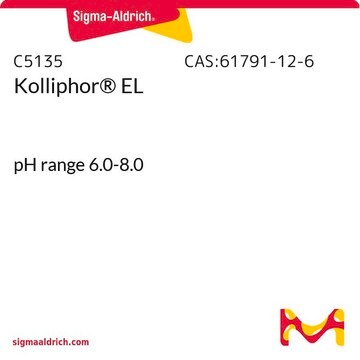50246
Poloxamer 407, micronized
Synonym(s):
Poly(ethylene glycol)-block-poly(propylene glycol)-block-poly(ethylene glycol), Lμtrol micro 127
About This Item
Recommended Products
mol wt
~9840-14600 g/mol
Quality Level
composition
oxyethylene content, 71.5-74.9%
impurities
≤0.25% ethylene glycol and diethylene glycol
≤0.4% total ash
≤0.75% water
≤1 ppm ethylene oxide
≤2 ppm arsenic
≤20 ppm heavy metals
50-125 ppm butylhydroxytoluene
ign. residue
≤0.30%
color
APHA: ≤120
particle size distribution
, coeff var ≤10% (residue, No. 140 USS)
, coeff var ≤50% (residue, No. 270 USS)
pH
5.0-7.5(1:10)
5.0-7.5(1:40)
suitability
complies for Infrared spectrum
SMILES string
O2C(C2)C.O1CC1
InChI
1S/C3H6O.C2H4O/c1-3-2-4-3;1-2-3-1/h3H,2H2,1H3;1-2H2
InChI key
RVGRUAULSDPKGF-UHFFFAOYSA-N
Looking for similar products? Visit Product Comparison Guide
Related Categories
Application
Analysis Note
1,4-dioxane ≤5 ppm, ethylene glycol ≤620 ppm ( verified on random samples only)
Other Notes
Legal Information
Storage Class Code
11 - Combustible Solids
WGK
WGK 3
Flash Point(F)
Not applicable
Flash Point(C)
Not applicable
Regulatory Listings
Regulatory Listings are mainly provided for chemical products. Only limited information can be provided here for non-chemical products. No entry means none of the components are listed. It is the user’s obligation to ensure the safe and legal use of the product.
JAN Code
50246-1KG:
50246-BULK:
50246-VAR:
Choose from one of the most recent versions:
Already Own This Product?
Find documentation for the products that you have recently purchased in the Document Library.
Customers Also Viewed
Our team of scientists has experience in all areas of research including Life Science, Material Science, Chemical Synthesis, Chromatography, Analytical and many others.
Contact Technical Service





